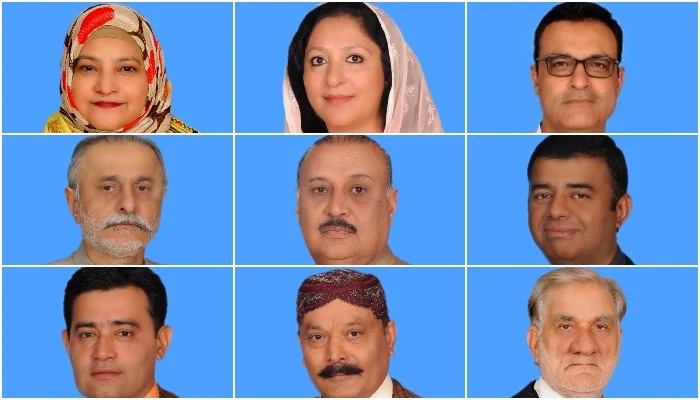Presidential reference forced by shock of PTI desertions
The points raised in the presidential reference refer to the gaps in Article 63A that it wants to be filled through its interpretation.
ISLAMABAD: The presidential reference provoked by the apparent desertion of more than a dozen lawmakers of the ruling Pakistan Tehreek-e-Insaf (PTI), seeks answers for the first time to precise questions from the Supreme Court.
Legal experts note that although the advisory jurisdiction of the apex court has been invoked, the opinion expressed by the apex court would be binding like other judgments and orders.
Among other points, the interpretation of Article 63A has been requested in the reference. The PTI, that has always welcomed defections from other parties when such deserters had joined its ranks, was not expected to ask for the interpretation of the constitutional clause had it not been struck by a massive wave of floor-crossing at the most crucial time. In the past, the PTI had been dubbing the switching of loyalties by politicians as the ‘voice of their conscience’ while today it describes it as the' selling of souls’ by them, allegedly for hefty monetary considerations.
It appears from all accounts that the Supreme Court will come out with the requisite interpretation of Article 63A after the voting on the no-confidence motion against the premier has taken place. Since the apex court has not issued any order about the validity or otherwise of the votes now cast, the ballots, if any, would be legitimate and the outcome of the proceedings will be lawful and final. If the resolution is defeated, Imran Khan will survive as the prime minister and if it is carried, he will stand ousted.
The letter and spirit of Article 63A elaborated by legal experts makes it clear that no MP can be stopped from casting his vote in favour of or against the no-trust resolution. The concerned lawmaker will have to face the adverse consequences only after that.
It is an open question whether or not the interpretation given by the apex court will apply to those who had voted against the party chief’s direction in the present no-confidence motion.
Legal experts point out that when a lawmaker had been disqualified by a superior court for possessing, for example a fake degree, the votes he had cast in parliament during lawmaking, or any other business had not been declared invalid retrospectively.
It will also be decided by the court whether the unseating of a defector is only for the seat he has held and whether he can take part in any future elections or by-polls or will a ban be imposed for lifetime. The government wants all the PTI floor-crossers to be ousted from the electoral field for life.
The reference’s own interpretation in the form of a question for the court is that the plea visualises Article 63A as “prophylactic [intended to prevent disease], enshrining the constitutional goal of purifying the democratic process by rooting out the mischief of defection by creating deterrence by neutralising the effects of a vitiated vote followed by lifelong disqualification for the member found involved in such constitutionally prohibited and morally reprehensible conduct.”
It also notes a question for the consideration of the Supreme Court: whether dishonesty by way of defections warrants no pre-emptive action save the unseating of the MP as per the prescribed procedure with no further restriction or curbs from seeking election afresh.
The reference asks the court whether a member who engages in the constitutionally prohibited and morally reprehensible act of defection could claim the right to have his vote counted and given equal weightage or if there was a constitutional restriction to exclude such tainted votes. And whether a parliamentarian who had been declared to have committed defection would be disqualified for life. “What other measures and steps can be undertaken within the existing constitutional and legal framework to curb, deter and eradicate the cancerous practice of defection, floor crossing and vote-buying?”
The reference states that owing to the weak interpretation of Article 63-A entailing no prolonged disqualification, such members first enrich themselves and then come back to remain available to the highest bidder in the next round perpetuating this cancer.
The points raised in the presidential reference refer to the gaps in Article 63A that it wants to be filled through its interpretation.
Article 63A says: “If a member of a parliamentary party (PP) composed of a single political party in the National Assembly, provincial assemblies or Senate resigns from membership of his political party or joins another PP; or votes or abstains from voting contrary to any direction issued by the PP to which he belongs, in relation to election of the Prime Minister or the Chief Minister; or a vote of confidence or a vote of no-confidence; or a Money Bill or a Constitution (Amendment) Bill; he may be declared in writing by the party head to have defected from the political party, and the party head may forward a copy of the declaration to the Presiding Officer and the Chief Election Commissioner (CEC) and will similarly forward a copy of it to the member concerned . However, before making the declaration, the party head will provide such a member with an opportunity to show cause as to why such a declaration may not be made against him. The party head means any person, by whatever name called, declared as such by the party.”
A lawmaker will be deemed to be a member of a PP if he, having been elected as a candidate or nominee of a political party which constitutes the PP or, having been elected otherwise than as a candidate or nominee of a political party, has become a member of such PP after such election by means of a declaration in writing. Upon receipt of such a declaration, the Presiding Officer will within two days refer, and in case he fails to do so it shall be deemed that he has referred, the declaration to the CEC who will lay the declaration before the Election Commission of Pakistan (ECP) for its decision confirming the declaration or otherwise within 30 days of its receipt by the CEC. When the ECP confirms the declaration, the concerned legislator will cease to be a member and his seat will become vacant. Any party aggrieved by the decision of the ECP may, within 30 days, prefer an appeal to the Supreme Court which will decide the matter within 90 days from the date of the filing of the appeal.
-
 Kate Hudson Gushes Over Oscar Nomination At 21
Kate Hudson Gushes Over Oscar Nomination At 21 -
 Pink Delivers Blunt Message On Split Rumours, Calls Reports 'fake News'
Pink Delivers Blunt Message On Split Rumours, Calls Reports 'fake News' -
 Pink Separates From Carey Hart Call It Quits 20 Years After Marriage
Pink Separates From Carey Hart Call It Quits 20 Years After Marriage -
 Kanye West's Best Songs: Fans Argue Over Bold Top 10 Ranking On Social Media
Kanye West's Best Songs: Fans Argue Over Bold Top 10 Ranking On Social Media -
 King Charles Secretly Relies On Advice From THIS Royal
King Charles Secretly Relies On Advice From THIS Royal -
 Jennifer Garner Reveals Beauty Choice She Makes As Botox Alternative In Her 50s
Jennifer Garner Reveals Beauty Choice She Makes As Botox Alternative In Her 50s -
 Kate Middleton Drops Four-word Message For Young Girl After Wales Visit
Kate Middleton Drops Four-word Message For Young Girl After Wales Visit -
 Shamed Andrew Uncensored ‘massages’ Should Be Refunded To Public
Shamed Andrew Uncensored ‘massages’ Should Be Refunded To Public -
 Kylie Kelce Reveals Rules She Wants Daughter Bennett To Learn At 3: No More 'passies'
Kylie Kelce Reveals Rules She Wants Daughter Bennett To Learn At 3: No More 'passies' -
 Smartphone Market Set For Biggest-ever Decline In 2026
Smartphone Market Set For Biggest-ever Decline In 2026 -
 Mud, Rain, Loincloths: All About Japan’s 200-year-old Harvest Wrestling Ritual
Mud, Rain, Loincloths: All About Japan’s 200-year-old Harvest Wrestling Ritual -
 Jonathan Majors Set To Make Explosive Comeback To Acting After 2023 Conviction
Jonathan Majors Set To Make Explosive Comeback To Acting After 2023 Conviction -
 Next James Bond: Why Jacob Elordi May Never Get 007 Role?
Next James Bond: Why Jacob Elordi May Never Get 007 Role? -
 Maddox Drops Pitt From Surname In Credits Of Angelina Jolie’s New Film 'Couture' Despite Truce From Father's End In Legal Battle
Maddox Drops Pitt From Surname In Credits Of Angelina Jolie’s New Film 'Couture' Despite Truce From Father's End In Legal Battle -
 Meghan Markle Adds Diamonds To Engagement Ring For Jordan Trip
Meghan Markle Adds Diamonds To Engagement Ring For Jordan Trip -
 Burger King Launches AI Chatbot To Track Employee Politeness
Burger King Launches AI Chatbot To Track Employee Politeness




